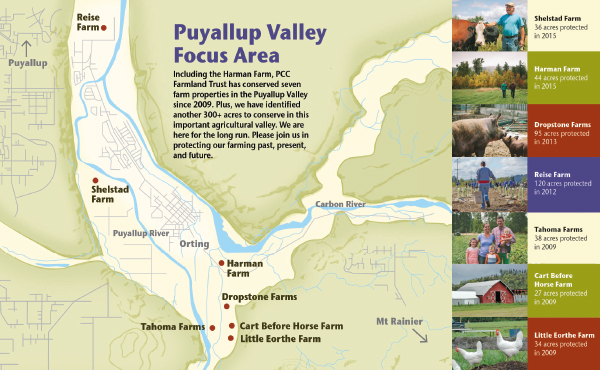Sustainable agriculture gains momentum in the Puyallup Valley
by Maura Rendes
This article was originally published in February 2016

Between 1997 and 2007, Pierce County lost nearly 23 percent of its farmland, much of it in the fertile Puyallup Valley. At this time, one quarter of the county’s farmland was slated for development. With the announcement of these startling numbers, PCC Farmland Trust began working with partners in an effort to curb the conversion of some of the state’s best farmland. About 2,000 acres were identified as top priority for conservation.
Between 2010 and 2015, the Farmland Trust invested $4.9 million to conserve 397 acres — 20 percent of the acreage identified in the long-term goal. Seven family farms on that land produce an array of products, including eggs, honey, herbs, vegetables, pork, poultry, beef, animal feed, berries and hay. They represent the shift back toward sustainable and diversified land management and continued celebration of local agriculture in the region. Across Pierce County, the total market value of agricultural products is $91 million — making farming a critical economic driver.
Renewed farming interest
Three farm families tell us they moved their farm operations to the Puyallup Valley, in large part due to the conservation work of PCC Farmland Trust and the political support of the county and the City of Orting toward agriculture.
In 2009 Kim Shelstad and his wife fell in love with a farm in the heart of Orting. While it had the potential to be prime grazing land, it needed substantial cleaning and clearing. The couple restored the property and their hard work will have a lasting benefit now that the Farmland Trust has conserved the farm in perpetuity.
PCC Farmland Trust recently surveyed 250 farmers across Washington to gauge interest in the Puyallup Valley and other regional focus areas, and to identify ways to support new and expanding farm businesses. PCC Farmland Trust and its partners in the area are committed to building and retaining the region’s agricultural legacy.
Leveraging community
A strong sense of agricultural neighborliness can be credited for much of this renewed interest. Beyond the rapidly increasing price of land, startup costs can be extremely prohibitive for new or expanding farms. In the Orting area, there are several farmers who share resources, from tractors and equipment to expertise and an extra hand.
As Kim Shelstad began making improvements on his new farm, he joined forces with another recent Puyallup Valley farmer transplant to pool their resources to buy tools and equipment, eventually helping one another build two hoop houses on each of their farms. Kim recalls reaching out to countless other farmers for support and advice when he first started, and now he gets to pay it forward. He recently hosted a tour for young farmers who will call on his experience as they start or expand their own operations.
When farming communities are fragmented by development, this type of sharing can be limited, or lost. Similarly, without a critical mass within a regional service area, agricultural resources and support can be harder to come by.
Environmental ethic
These and other farm properties also are bringing environmental restoration to the Puyallup Valley watershed. On Farmland Trust conserved properties alone, 6,300 feet of restoration and enhancements have been made by hundreds of Farmland Trust volunteers and experts, improving more than half of all on-farm riparian habitat. Many farms are taking their sustainability efforts to the next level, receiving Salmon Safe certification, installing solar panels, and managing for safe flooding.
In addition to their organic production and soil and water conservation practices, Dan and Kim Hulse have installed solar panels on one of their barns at Tahoma Farms. They produce 10,000 kilowatt/hours of electricity annually, offsetting one-third of the farm’s energy consumption. They are reinvesting these savings in other efficiencies, like converting their 1940s cultivating tractor to run as an electric vehicle. These are all part of an important broadening of the meaning of sustainable agriculture.
What’s next?
The Pierce County community continues to come together to invest time, expertise and resources in advancing the interests of agriculture and sustainability in its most important farming regions, such as the Puyallup Valley. PCC Farmland Trust has an additional 300 acres queued up the conservation pipeline for 2016 and 2017. Of the 2,000 priority acres originally identified, this would bring its progress to 40 percent. Together, we can sustain this momentum.
Maura Rendes is the former communications manager at PCC Farmland Trust.
